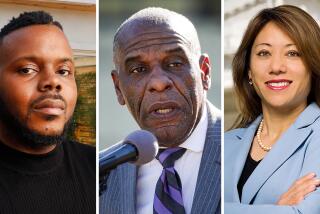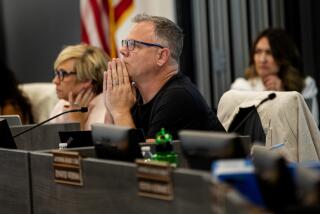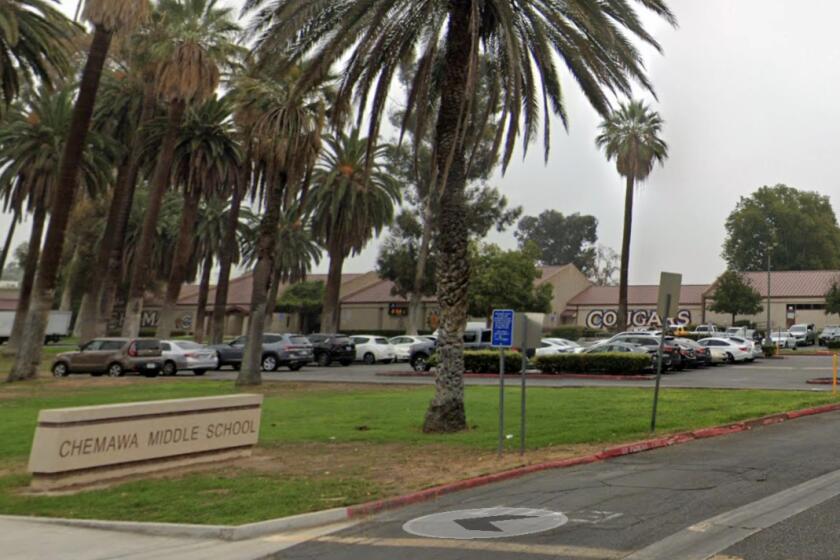Incumbent Torlakson takes the lead in race for state schools chief
In the most expensive political race in California, incumbent Tom Torlakson held the lead late Tuesday night over Marshall Tuck in the contest for state superintendent of public instruction.
Shortly before midnight, Torlakson cautiously predicted victory, calling the contest “the toughest election in my career.”
“They were strong, but we were stronger,” he said.
Tuck, meanwhile, said late Tuesday that his campaign focused on upsetting the status quo.
“People thought we had no chance but we’re knocking on the door of finally making the changes to public education that our children deserve,” Tuck said.
Although the office has little direct authority over schools, the contest came to assume national significance as a proxy battle between two visions of how best to improve public education.
A deluge of campaign ads — at least $10 million was raised on each side — suggested that the candidates were diametrically opposed, that the future of schooling in California would be dramatically different if Torlakson or Tuck won.
They took divergent positions on some hot-button issues — teacher job protections and evaluations, for example — but the two weren’t far apart on other fundamentally important ones.
“They agree on a good number of the basic education policies,” said Bill Koski, a professor of law and education at Stanford University. “The contest has to do more with a sense of tone and tenor for the direction of education policy.”
The political and education establishment “will perceive a Torlakson win as saying: ‘We’re not ready to do incredibly disruptive reform,’” Koski said. A win for Tuck would send a message “that we need to do more to change the status quo.”
Most of the funding for the Torlakson campaign came from teacher unions and other labor allies. Generally speaking, they favor providing more resources to schools, while also making sure such aid is used more effectively. They see data from standardized tests as a tool to guide instruction rather than to evaluate teachers.
The efforts on behalf of Tuck were overwhelmingly paid for by wealthy donors as well as by advocacy groups largely funded by such contributors. They wanted to counter the influence of teacher unions and generally support using student test scores as a major factor in determining teachers’ pay and job security. And they want to promote market-based competition such as charter schools.
Yet both supported higher funding for schools and, in particular, a new funding plan that sends more dollars to districts with higher numbers of low-income families, students learning English and foster children.
Both also backed new Common Core learning standards adopted by 46 states, including California. These grade-by-grade learning goals in math and English have become heated election fodder elsewhere.
“I’m not surprised that we have some alignment,” Tuck said. But he insisted that Torlakson, 65, has provided poor leadership, even on matters of agreement such as the need to prepare for the new standards.
Tuck, 41, formerly headed a group of charter schools, which are publicly funded but independently run; most are non-union. For that reason, he’s associated with charter support. But it’s not clear how he could alter California’s legal and political landscape, which already is pro-charter.
“The big changes that are unfolding in California are really matters of agreement regardless of whether Tuck or Torlakson wins,” said David Plank, executive director of Policy Analysis for California Education, a research partnership of USC, Stanford, UC Berkeley and UC Davis.
Torlakson downplayed the national attention on the race, saying he was focused on “California’s needs.” But he stressed the importance of the state’s “independent course” from reforms sweeping other parts of the nation.
One key area of disagreement was job protections for teachers. Tuck supports this year’s verdict in Vergara vs. California, which stripped teachers of tenure protections, prohibited seniority-based layoffs and struck down rules that made it harder to dismiss permanent instructors. The ruling is pending; Torlakson has filed an appeal. Tuck said he would withdraw that, although he doesn’t oppose all forms of tenure.
“That would be a profound point of difference if the state superintendent had anything to say about it,” Plank said.
The case would continue regardless of who wins the election, because of appeals filed by Gov. Jerry Brown, the state Board of Education and teacher unions.
Still, the nonpartisan office was important enough for unions to defend at all costs, and for union critics to target with help from high-profile donors such as former New York Mayor Michael Bloomberg ($500,000), local philanthropist Eli Broad ($1 million) and Wal-Mart family heirs Carrie Penner ($500,000) and Alice Walton ($450,000).
howard.blume@latimes.com
Twitter: @howardblume
Times staff writers Paige St. John in Sacramento and Stephen Ceasar in Los Angeles contributed to this story.
More to Read
Sign up for Essential California
The most important California stories and recommendations in your inbox every morning.
You may occasionally receive promotional content from the Los Angeles Times.











